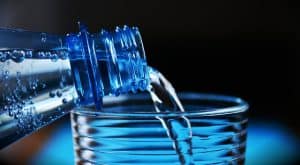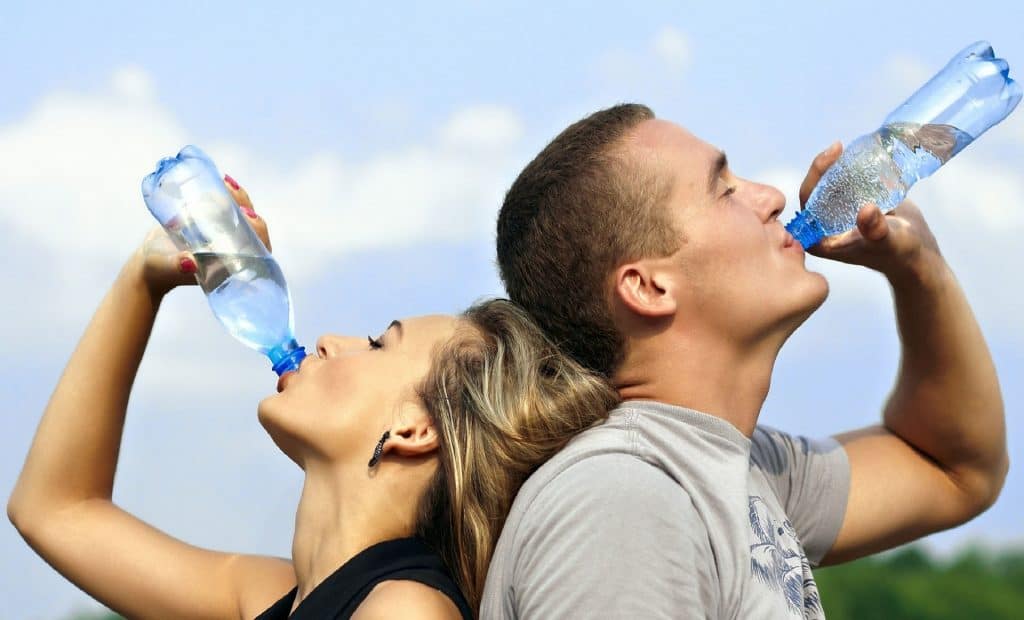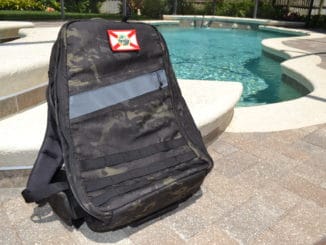Here at FitAtMidlife.com one of our primary nutritional rules is : Thirsty? Drink water.

Everybody knows that water is essential to life, and we drink when we are thirsty. But do you really need any beverage besides water? Ok, maybe coffee, and alcohol in reasonable proportions, if you partake in it. But I think you’ll understand the benefits of drinking water when you are thirsty:
- Water has 0 calories
- Water is plentiful
- Water is often free, and almost always the cheapest option
- Cold water can help you cool down
- Water is flavorless
Water is what your body naturally craves when thirsty. Sodas, fruit juices, milk, and other beverages are loaded with calories. And it’s very easy to drink a lot of calories.
Water, on the other hand has 0 calories, and can actually help blunt your appetite, leading you to eat less.
What About Sparkling Water?
Carbonated water, commonly called sparkling water, is water that has carbon dioxide gas dissolved within it. This dissolved gas provides effervescence – bubbles. This adds no calories – so it should be a zero calorie drink, assuming nothing else has been added.
Carbonated is more acidic than regular water – it has a lower pH. It may help digestion in people with low levels of stomach acid.
Club soda is carbonated water to which salt has been added – this balances out the acidic qualities and makes the flavor more closely mimic the carbonated water found naturally in springs.
Otherwise, drink whichever you prefer.
How Much Water Do You Need to Drink in a Day?

How much water do you need to drink each day? For years many sources have recommended 6-8 glasses of water (8 oz serving size) per day.
But honestly, it depends on what activities you perform during the day. Working outside? You certainly need more water than someone sitting at a desk all day. Further, all beverages and the foods you eat contain water as well. Perhaps the best guide is thirst. Drink when you are thirsty, or before you undertake any intense activity that’s going to accelerate water loss.
Also consider that the solid foods you eat also contain water – especially vegetables. For most people, up to 20% of your daily water intake is from the food you eat. Iceberg lettuce is 95% water by weight, as one example. Spinach and tomatoes are 91% water by weight.
The Importance of Electrolytes
Also consider that if you are sweating a lot you need to replenish electrolytes as well, and not just water. These are essential to your body – they regulate heart and neurological function, fluid balance, muscle contractions, nerve impulses, and more. Cells use electrolytes to maintain voltages and to carry the necessary electrical impulses across themselves and to other cells.
Sports drinks are one option to replenish electrolytes – but watch out for added sugars. For a low calorie option, try these SaltStick FASTCHEWS 60-count Bottle of Chewable Electrolyte Replacement Tablets (Buy on Amazon). Each SaltStick Chewable contains: 100 mg sodium, 30 mg potassium, 10 mg calcium, and 6 mg magnesium. With two flavor choices, and sweetened with all-natural Stevia, it’s recommended to take two of these every 30 minutes. Why? The ingredients are formulated in a ratio to closely resemble the electrolyte profile lost in sweat.
What kinds of electrolytes are important for your body?
- Sodium – Fluid balance, nerve and muscle function
- Potassium – Primarily heart function
- Magnesium – Heart rythm, nerve function, and muscle contraction
- Calcium – Beyond being used for building strong bones and teeth, calcium is important for maintaining blood pressure and muscle contraction
- Phosphorous – Used for many functions alongside calcium
- Chloride – Fluid balance
Consider that any condition that could lead to dehydration can cause electrolyte loss such as vomiting or diarrhea. An electrolyte imbalance can be life threatening. If symptoms are severe, consult medical help immediately.
Symptoms of electrolyte imbalance can include: muscle cramps, irregular heartbeat, fatigue, lethargy, nausea, vomiting, muscle weakness, and irritability.
And lastly, electrolyte levels must not be excessive either. Too much of any of these substances will also cause problems for the body. Use particular care if you are replacing electrolytes with supplements and multi-vitamins – which make it easy to get very large quantities of these substances.
Not convinced water is important to health? Remember these points:
- Your body is 60% water. Water is used in all cells, tissues, and organs to maintain temperature and for proper function.
- Your body loses water via breathing, sweating, and digestion, and therefore it constantly needs to be replaced.
- Water acts as a cushion for your spine and other joints
- Water is essential for healthy skin
OK, there’s more – but you get the point – water is vital to life. So there’s no excuse to not drink more water!


Tim is the founder of FitAtMidlife.com – an avid gym rat for 30+ years, he’s a reviewer of many, many shoes – and founder of the Speed Bag Gathering – the world’s only gathering of speed bag punching enthusiasts. See more gym reviews at Tim’s YouTube channel.


